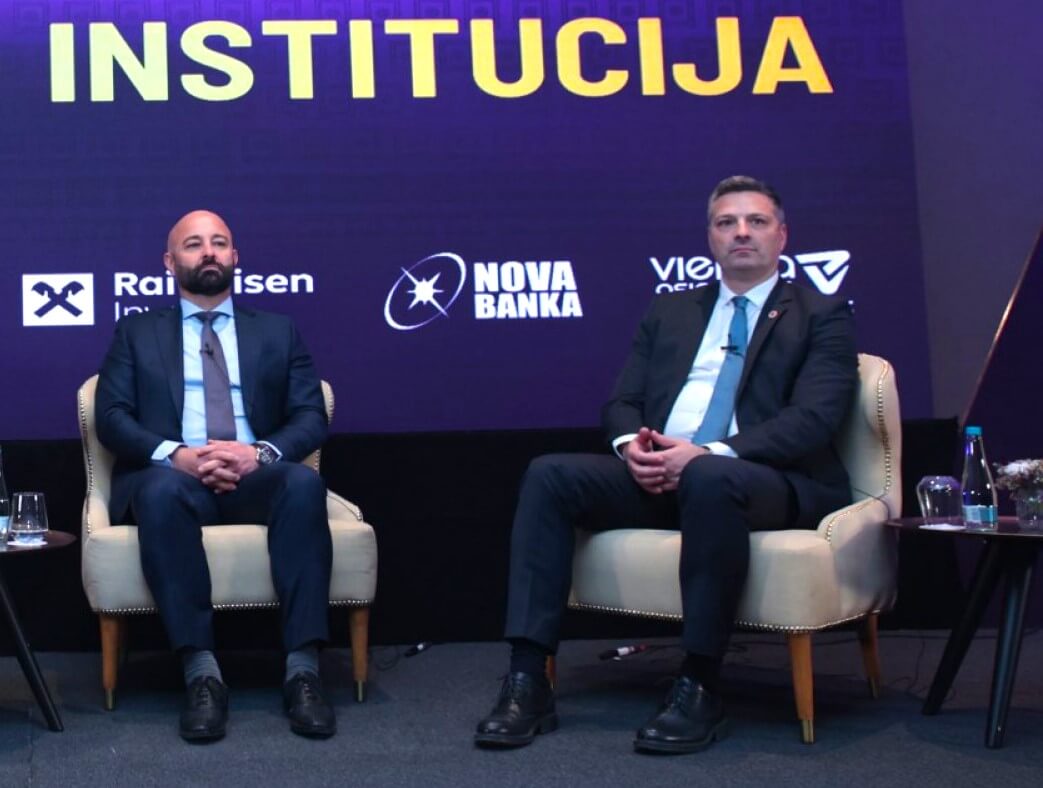Without any oversight, the Banking Agencies in BiH have has created a stable business environment for microcredit organizations like Digital Finance International, owned by sanctioned Russian oligarch Oleg Boykov. These organizations offer quick loans at exorbitant interest rates, leading inevitably to debt slavery.
Loans are granted without documentation, with no hidden fees, and can be applied for online, promising cash in hand within 15 minutes -these are just some of the marketing slogans used to promote quick loans with effective interest rates exceeding 5000%, targeting citizens of Bosnia and Herzegovina.
A bit of statistics
Bosnia and Herzegovina is one of the poorest countries in Europe, with an average net salary of BAM 1.304, an unemployment rate of 13.5%, and a very low level of financial literacy. Coupled with limited access to traditional financial institutions, citizens in our country are increasingly turning to Payday lenders.
Payday loans, also known as quick loans, are short-term, high-interest cash loans based on income. Typically, the loan principal usually equal to a portion of the borrower’s upcoming salary and is provided without requiring collateral.
These loans are widely regarded as predatory due to their exorbitant interest rates, hidden fees, and the lenders’ indifference to the borrower’s ability to repay.
Because of their exceptionally high costs, payday loans often ensnare borrowers in a cycle of debt which they cannot escape burdened by the accumulated debt from using these types of lending services.
While regulators in Western Europe and neighboring regions restrict the operations of such financial organizations by limiting effective interest rates or tightening loan approval criteria, the competent regulators in BiH—the RS Banking Agency and the FBiH Banking Agency—have failed to establish a system for business oversight and citizen protection from these loans.
This raises the question: why?
When Russians and Bulgarians are lending you the money
Digital Finance International is a subsidiary of the Russian financial group Finstar, headquartered in Moscow, operating across Europe, the USA, Asia, and Latin America.
The group is led by Russian oligarch Oleg Viktorovich Boyko, who has close ties to the Moscow regime. According to Forbes, his fortune is estimated at $1.2 billion. Due to his connections with Vladimir Putin’s regime, Boyko is subject to sanctions imposed by Australia and Ukraine
Boyko amassed his “original capital” following non-transparent privatization in the former Soviet Union, building his business empire primarily in finance, real estate, steel trading, gambling and betting, media, and digital technology development.
According to a 2017 US intelligence services’ report, Boyko was identified as “an individual with troubling ties to the Russian government and Russian security services involved in organized crime”. He is also implicated as the main actor in a tax avoidance scheme involving millions of euros through companies based in Malta.
Oleg Boyko/Photo: moderndiplomacy.eu
The companies of the Russian oligarch, whom Ukrainian media have linked to the former KGB, and Moldovan media to interference operations in Balkan elections, are active in Croatia through betting and in Bosnia and Herzegovina, Macedonia, and Albania through microcredit financial services.
Digital Finance International, a microcredit company, has been operating in BiH since 2016, having obtained necessary permits from the RS Banking Agency. Two years later, following personnel changes within the FBiH Banking Agency, the company obtained a license to operate in the FBiH territory.
According to available registry data, this company is owned by Digital Finance International Limited, registered in Cyprus, and operates in our country by offering two financial products.
The Forza program provides short-term loans with a repayment period of up to one month. For first-time users, the maximum loan amount is BAM 400. If the loan is repaid on time, an additional BAM 40 is paid as interest.
But, if you take BAM 400 and withdraw the full amount, repaying it after 12 months, the credit user then pays annual interest rate of 120% for the first month and 240% for each subsequent month. Ultimately, the effective interest rate for this loan amounts to 645.23%.
The total amount for this loan is BAM 1.320, consisting of BAM 400 as principal and BAM 920 in interest. The final interest amount varies based on the repayment pace.
Another product available in the BiH market is Kreddy.ba, offering a maximum loan amount of BAM 3.000 with a repayment period ranging from 3 to 18 months and an Effective Interest Rate (EIR) of 86.49%.”
The market gap left by the departure of the Estonian microcredit company Iutecredit from BiH, due to accumulated losses totaling BAM 5.5 million, has been filled by Flexkrediti, a microcredit organization founded in 2022 in the Republika Srpska by Bulgarian companies MV Finance with 80% ownership and Goran Arsov with 20% ownership.
Office of Flexcredit Sarajevo/Photo: N1
Today, this microcredit company also operates in the Federation of Bosnia and Herzegovina, offering various quick loan services. For instance, their “Payday loan” product has an Effective Interest Rate (EIR) of 5370.31% with a nominal interest rate (NIR) of 300%. Additionally, there is an express approval fee of 7.342% based on the approved loan amount.
From regulator to consultant
According to available publications, the average weighted effective interest rates in the microcredit sector in the Republika Srpska for 2023 were 22.30 percent, while in the Federation of BiH they were slightly higher at 22.86 percent.
We sought clarification from the Banking Agency of the RS and FBiH regarding the significant disparity between these average interest rates in the sector and the interest rates charged by companies like Digital Finance International or Flexkrediti.
Despite our persistent inquiries, we have not received any responses regarding interest rates, oversight of these financial companies’ operations, or the source of their founding capital.
Employees of the FBiH Banking Agency/Photo: FBA
During a telephone conversation, Srđan Šuput, Director of the RS Banking Agency, emphasized that we will not get any answers. Similarly, no response has been received from the FBiH Banking Agency despite a series of inquiries we sent.
The lack of responses to these questions is particularly concerning considering that regulators are the ultimate authority responsible for safeguarding the market and educating citizens about the implications of utilizing these financial services
The entire Balkan region is inundated with companies backed by foreign capital and characterized by unclear ownership structures. Branimir Jovanović, an economic expert specializing in the Western Balkans at the Vienna Institute for International Economic Studies, highlights that poverty levels in these former Yugoslav countries are so severe that these loans constitute the sole financial survival model available.
“For this reason, the effective (total) interest rates on these quick loans must be limited to mitigate these issues. Macedonia implemented such measures in 2018, setting the limit at around 50%, and other European countries have similar restrictions in place. If they can do it, why can’t Bosnia and Herzegovina? While an interest rate limit will not solve all the problems associated with these loans, it certainly provides significant assistance.”
Branimir Jovanović/Photo: istokrs.com
The regulation of companies providing quick loan services in Bosnia and Herzegovina, as well as in the region, is weak or non-existent. Jovanović points out that such an environment opens the door to business operations of dubious companies.
“Quick loans are considered high-risk activities for money laundering, akin to casinos and betting shops, because distinguishing between legitimate and fictitious transactions is challenging. In our countries, where state institutions have weak administrative capacities and lax law enforcement, oversight of these new entities is practically non-existent, allowing companies to exploit the situation.”
In addition to the regulator’s weak capacity, Jovanović emphasizes the intertwined connections between the owners of these companies and politics. This underscores the need for scrutiny in business controls and the process of obtaining business permits.
“Adequate oversight is lacking, partly due to the weak administrative capacities I mentioned earlier, but also because these companies often have connections to government officials. In Macedonia, for instance, these loans began emerging around 2015/16, with ties to the then-government. As political leadership changed, the influence of these initial companies waned, only to be replaced by others linked to the people of the new government.”
Be careful of whom you are texting
During mid-2021, Albania was shaken by a scandal involving the leakage of personal data from 600.000 users of quick loans from Credit 2 All-Digital Finance International SHPK, which is according to the RSE’s report a company owned by Oleg Boykov.
This incident marked the largest breach of personal data and subsequent sale on the black market. Documents containing monthly salary information of thousands of citizens employed in both public and private sectors, including well-known individuals, were disseminated through social networks
As a result of this scandal, the Albanian police arrested four employees of this company, sparking a discussion on personal data protection.
Digital Finance International in BiH offers an online loan application service. According to information from customer service, individuals can apply for a short-term loan in the Federation of BiH by submitting required documentation, CIPS (certificate of permanent residence) not older than one year, identity card, and pay slip at the nearest branch office. Subsequently, their request is processed further.
If you are applying from Republika Srpska, you can submit all required documentation via Viber.
According to information on the Forza.ba page, “all your information and data are processed using the most secure protocols and encryption in the world. Our company invests heavily in the security of our IT systems and processes. We employ the most advanced technologies available globally, which sets us apart in the region.”
As of the publication of this text, Digital Finance International has not responded to inquiries from the Tačno.net portal.










